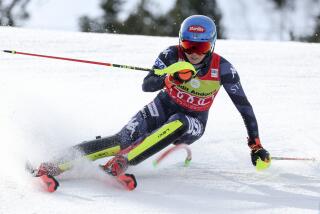‘94 WINTER OLYMPICS / Lillehammer : Swiss Ski Great Adds to Legend
- Share via
OYER, Norway — Vreni Schneider wouldn’t concede that winning the gold medal Saturday in slalom was a fitting way to end her Olympic career.
At 29, it is unlikely that the Swiss star will still be beating back the teen-agers at the 1998 Nagano Games, but why start conceding?
Had she conceded that .68 of a second was too much time to make up on leader Katja Koren after the morning run, Schneider could have never made history with a seamless second run that allowed her to claim the gold by 1.79 seconds over runner-up Elfriede Eder of Austria, the silver medalist.
Koren, from Slovenia, who had posted the fastest first-run time from the 33rd starting position, took the bronze.
Schneider might now stake a claim to the title of best female skier ever, which has long been held by Austria’s Annemarie Moser-Proll, who retired with 62 World Cup victories and three Olympic medals.
Schneider is second on the all-time World Cup win list with 50, and the rest of her career ahead. Her victory Saturday was no upset. She had won five of the eight World Cup slaloms this season.
The race marked the first Olympic breakdown for the U.S. ski team. Of America’s four starters, only Carrie Sheinberg completed the race, finishing 18th.
In winning her third Alpine medal of these Games, Schneider became the first woman to win five of them. To the gold medals she won in giant slalom and slalom at the 1988 Calgary Games, she added this slalom gold, a silver in Alpine combined and a bronze in giant slalom.
There have been lean years for Schneider, particularly 1992, when she slumped badly and finished out of the medals at the Albertville Games.
But there were never concessions.
“My health is good,” Schneider said. “I will listen to the voice inside myself about the future, in the spring. I prefer to enjoy this very great moment.”
She had only the fifth-fastest time in the first run but, of those ahead of her, only Sweden’s Pernilla Wiberg matched her in slalom savvy.
Koren, Slovenia’s comeback kid, won a super-G earlier this season from the 66th start. When she shot into first on the first run from the 33rd position, her Olympic dream was already fulfilled.
Koren squinted into the sun at the timing board, stared for a good 10 seconds, finally figured out she was first, then thrust her arms in the air.
“I didn’t believe it was possible,” she said.
Skiing last among top seeds in the second run, the 18-year-old Koren admitted she was just skiing for a medal. Schneider had posted an unbeatable time, and Eder was entrenched in second.
It was heady enough stuff that Koren could knock Wiberg, the gold medalist in combined, off the victory stand.
It was the second Olympic medal for Slovenia as an independent nation. Earlier in the week, Alenka Dovzan had won the bronze in combined.
These were proud moments for a nation that broke free from the former Yugoslavia in 1991, although Slovenians are offended that the Olympic computer information system has credited both medals to Slovakia.
“We are not Slovakia,” Tone Vogrinec, the Slovenian coach, said. “It’s a big difference, about 800 kilometers on the map.”
Eder’s silver was the second medal in these Games for the Austrian Alpine team, which has dominated the World Cup the last few seasons.
Austria’s performance has obviously been affected by the death of Ulrike Maier, killed in a downhill race Jan. 29.
“You have to keep on fighting,” Eder, 24, said. “Life goes on. I tried to be like Ulli. I had a very strong image of Ulli, to fight the way she used to do.”
More to Read
Go beyond the scoreboard
Get the latest on L.A.'s teams in the daily Sports Report newsletter.
You may occasionally receive promotional content from the Los Angeles Times.







